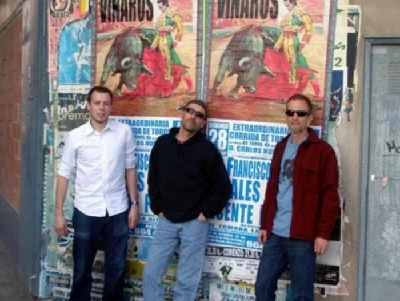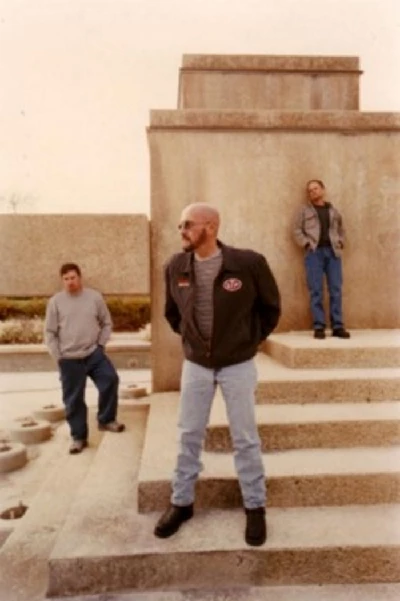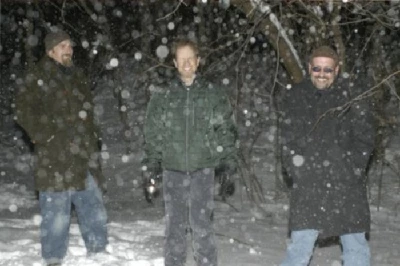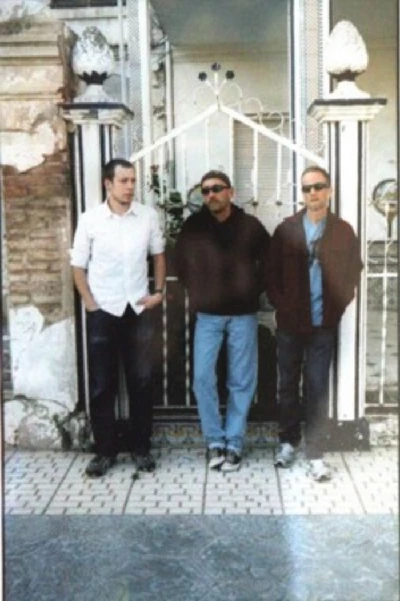published: 20 /
4 /
2008
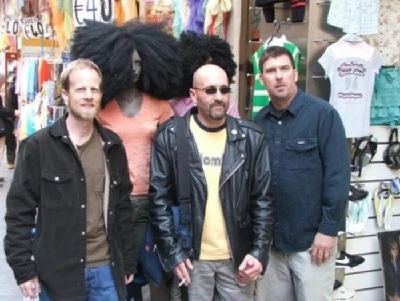
Vocalist/bassist Jeffery Runnings and guitarist Harry Dingman from Nebraskan post-punks For Against speak to Chris Jones about their band's long twenty five year history, seven albums and Dingman's recent return to the band after an absence of sixteen years
Article
“Music scene is crazy, bands start up each and every day” – Pavement (1994)
Ten years before Stephen Malkmus uttered those words, For Against was formed in Lincoln, Nebraska. Now for those of you outside the US (or inside it, for that matter) who are unfamiliar with Lincoln, Nebraska, well, that’s the thing really. It’s not the type of place that people really bother to get familiar with if they aren’t from around there.
I guess I first heard about Lincoln when I was in grade school and we learned the state capitals. Lincoln is also the home of the University of Nebraska, whose ‘Cornhusker’ football team was a perennial powerhouse in the 1990’s, winning 3 national championships in a 4 year period.
Now I’m not quite sure when or how I heard about there being a local music scene there that had some good bands, but Lincoln did gain a bit of a reputation for that at some point. Unfortunately for For Against, the local music scene was more about punk and metal than a post-punk, UK / Factory Records type of sound, so even within their own alienated town, For Against were outsiders.
It’s hard to know how much of a factor not fitting in it was, but despite (or in spite of) being in a city not known for indie music, For Against has persevered and just recently released their seventh album, 'Shade Side Sunny Side', on the Words On Music label. Pennyblackmusic caught up with the band just before the release of this album.
Interviewees: Jeffrey Runnings (vocals, bass) and Harry Dingman III (guitar)
PB : The band formed in 1984, a time when the punk scene was quite strong in the US, yet the early songs have much more of a Joy Division/Factory records quality to them. Were you fans of the UK post-punk sound at the time ? What bands would you say influenced you?
Runnings : We were definitely listening to a lot more British music than American... lots of Factory and 4AD as well as Rough Trade and Fast Product and Zoo... we were firmly planted in indieville! Plus we were listening to a lot of British stuff on major labels, the GOOD stuff like early Cure, Comsat Angels, Banshees, Bunnymen, Wire, so much fantastic music!!
Dingman : We liked the British post punk sound like a lot of the Factory bands: Joy Division, New Order, Crispy Ambulance, Section 25, The Wake, Durutti Column-we loved the Cocteau Twins and Echo and the Bunnymen, Siouxsie and the Banshees, the Cure, Sad Lovers and Giants, Xmal Deutshland, Fra Lippo Lippi. Yet we could not ignore the underground American guitar jangle that was popular with bands like R.E.M., the 3 ‘O clock, D.B.’s, Let’s Active, and to some extent Pylon etc…. Basically For Against was an amalgam of all our favorite bands.
Our songs came to us quickly. For example before we released our debut album,'Echelons', in 1987 we put out a 14 song cassette LP ourselves (this cassette was never an official release, this was something we gave to our friends), but you can hear our influences more distinctly on those early recordings before 'Echelons'.
With 'Echelons' we really started to hone our own sound. The process of writing and recording songs influenced us a lot. We were not trying to please the Lincoln bar audience who for the most part wanted to hear their favorite cover songs. We had a sense of freedom in Lincoln, Nebraska to write whatever we wanted and didn’t care what the population of the city as a whole thought about us. The Lincoln hardcore punk and metal scene was also going at that time. We would sometimes share shows together and were friends with all the musicians –we would go to the same parties, go to a lot of the same shows and hang out, but for the most part did not fit in with that scene at all. For Against in 1984 had a small following of loyal friends and young people who really liked our songs and we would play for them.
PB : IPR, with whom you released your first five albums initially, was a fairly revered label at the time. What was it like being part of that ? Did the bands on IPR feel close to one another?
Runnings : Naturally we were thrilled since most US labels didn't have the style or artistic identity of IPR... I'd say there was much camaraderie amongst the bands that shared the IPR/Nate Starkman stable because we were all a bit out of the norm... it was quite a shock to get offered a deal by IPR at the time, but in retrospect, we do fit nicely with the music that IPR and Nate Starkman were working with.
Dingman : We got along well with all the IPR bands and played shows with Savage Republic, Four Way Cross, and The Red Temple Spirits. It was great to have bands that we could play with, that respected us and we fitted with stylistically.
We were completely blown away when Bruce Licher called and wanted to release 'Echelons' on his label. IPR was one of our favorite labels and we could not believe he wanted to put out our record and with a letterpress cover. With Bruce Licher we were able to collaborate on the artwork and it was really an honor to have our ideas and artwork printed on his letterpress. As far as the songs went, IPR released what we gave them. They never told us what to do. Bruce definitely would give us his opinion, but in the end we had the final say on songs. Bruce would select the song order and have the last word on the artwork but that was never an issue of control.
Then came the issue of the final mix for our second album 'December'. Basically Bruce wanted the mix that is the final 'December' mix – a mix that is warm and ambient. Our drummer at the time, Greg Hill, and Randy Watson (our producer and engineer, who recorded 'December') wanted a crisper, high end, ‘in your face’ mix. We went with the right mix, the one Bruce Licher wanted. It sounds appropriate for the songs and production. But at the time it created a huge rift in the band especially with Greg who wanted another mix and he consequently was the first one to leave the band.
Overall IPR was a great label to be on and very appropriate for us. We are still in contact with Bruce Licher and, who knows, we may do another cover with him someday.
PB : Did the band tour much during this time or were you mainly playing at clubs in Lincoln ?
Runnings : We did one large tour for 'Echelons' in summer 1987 that took us to the East Coast. We played about 20 shows ranging from tiny clubs with little audience (Pittsburgh, of course it doesn't help when the Cure are playing the same night, right down the street!) to nice clubs with good crowds (Chicago, Washington DC) to legendary dives (CBGB's).
Dingman : As I mentioned earlier, for the most part the club scene in Lincoln was not good for a band that played only original songs (we did do a cover of Section 25’s, ‘Friendly Fires’ and Joy Division’s, ‘Heart and Soul’, but Lincoln club audiences for the most part had never heard of bands like this). Club owners wanted bands that played popular cover tunes that audiences could dance to and get drunk – nothing original and not For Against.
There were a few clubs that let us play with other local underground original bands but, because no one showed up, these opportunities quickly fizzled. There was one local chicken restaurant that brought in a lot of underground national and international bands called the Drumstick. The “Stick” served greasy chicken by day and at night had bands like REM, the Professionals, Modern English, the Plastics, the Replacements, the D.B.’s. Red Hot Chilli Peppers, Lords of the New Church and Black Flag. It was really great to see touring acts come through and play at such a small venue. At the “Stick” we opened for 10,000 Maniacs, Let’s Active, and Soul Asylum. We did a few shows there by ourselves as the headliner, but we never could gain a local bar/club following.
For the most part we had to rent out buildings and halls ourselves or play at house parties to a younger audience who could not yet legally go to bars and clubs. The house parties were really fun; we’d set up in some high school kid’s parent’s house or basement and start blasting as loud as we could and then 80 kids would start dancing and thrashing around. Most of the time the parents who owned the houses were out of town or out for the night and the parents would sometimes come home in the middle of the show and it was just shocking to them to see this band playing and these kids just going wild in their living room – it was a lot of fun for us! We could perform for as long and loud as we liked and set up environment with visuals from film projectors and get local artists to display their sculptures suspended above the bands. I think the audience really felt they saw a show and just not some band in a bar. It really helped us to find a loyal Lincoln audience that is still with us today. We also played some bigger shows at larger halls with Gene Loves Jezebel and Suzanne Vega and that was gratifying to play in front of a huge audience.
PB : How tight was the Lincoln scene during this time?
Dingman : The people who were the earlier pioneers of the underground Lincoln music scene first started in the late 70’s and all the bands got along for the most part at that time. The late 70’s and early 80’s was the best time as far as the Lincoln music scene was concerned; there were so many good bands and so much going on. But by the time For Against was formed in 1984 everything was fractioned off and categorized, people were jaded, and it seemed like all the good bands had died off. If you were not a part of that particular scene you just were not cool. And the scenes did not mix at all.
Runnings : The Lincoln scene was mostly punk of the Southern California variety... we didn't fit in AT ALL.
PB : Athens, GA Chapel Hill, NC and DC are probably better known indie scenes. Did the bands in Lincoln feel like the underdogs of the underdogs ?
Runnings : No, the bands in Lincoln felt land-locked and overlooked... Nebraska is in the middle of nowhere, after all!
Dingman : I think there was generally a mood in Lincoln that all Lincoln bands were overlooked and a lot of people felt it was better that way – by not letting record industry and business dictate the music scene as a whole. We as For Against felt isolated being in the middle of nowhere and felt we were not really even part of the underground scene - which for the most part in 1984 was a super fast polka beat.
When we got signed to IPR we thought the Lincoln scene would accept us, and it did broaden our audience base a bit. But getting signed also created other problems with the camp of people who thought a Lincoln band should never get a record contract, either big or small. We were known as sell-outs and we heard things like, “Why should For Against get a record contract when they suck and they are boring anyway ?!” That was Lincoln in 1984.
PB : Your second album 'December' did fairly well on college radio in ‘88, but then the band went through one of several line-up changes. What happened that caused people to leave the band at that time ? Did it feel like the band was done ?
Runnings : The split after 'December' came about because we simply weren't getting along and no one was making very much of an effort to fix the situation... I think we were tired and we had different ideas about how the band should pursue its future... when Harry and Greg left, I floundered for awhile and then decided to try to continue working under the name For Against since they started a new group called the Millions.
Dingman : Greg Hill left the band to play with another band, The Return, with our producer/engineer Randy Watson. I think Greg thought things were not happening the way they should and I think he was ready to try something else. He was just sick of all the crap that goes along with being in a band and thought it would be different playing with other people. At this time Jeff was really elusive and we would not see or talk to him for weeks at a time. During the recording of 'December' we did the basic tracks in a few days and then we did not communicate at all or work together on the overdubs or production.I remember getting in arguments with our producer about using a drum machine instead of Greg on the song ‘The Effect’. We did not feel like a functioning band during the whole recording process and none of us did anything to change our situation. And then came the huge disagreements about the mix of 'December' to which I previously alluded.
In the end it just came down to the fact that no one really made an effort to try to save the band and we did not talk or communicate. We did not have a manager or anyone to say “Hey – buck up and get on with it!” Sometimes it was just impossible to work and play live or even be in the same room with each other. I did try to stay in For Against with Jeff but with the new drummer and bass player it was just more of the same, so after about a month I remember dropping off a guitar at Jeff’s house and we said we would call each other and schedule practice and think about replacing the new drummer. And then we never talked for another 16 years! The band definitely didn’t feel like it was done at that time, but our problems seemed too big to solve and the band was just not important anymore.
PB : By the time 'Aperture', your third album, was released in 1993, only you, Jeff, remained from the original lineup. That album has more of a dreampop sound than the earlier albums. Was that a conscious change the band made ?
Runnings : The thing that distinguishes Aperture as sounding different, more 'dreampop' if you will, is because I moved from bass guitar to electric guitar proper. Plus that batch of songs was firmly mine; there wasn't a lot of 'band collaboration' on those... I was entrenched in Creation and Sarah Records and echoed guitars to high heaven, so that's a lot of the reason 'Aperture' has a dreampop feel.
PB : Five years passed between the release of 'Shelf Life' in 1997 and 'Coalesced' in 2002. Were you still playing together during that time ? If not, what drew you back to the studio ?
Runnings : I'm afraid the time lapse was nothing more than laziness! We were playing the whole time, but since no one was pounding down our door for a new record, we didn't have any reason to rush one out!!
PB : How did you get hooked up with your current label Words On Music ?
Dingman : Words On Music wanted For Against to contribute a track to their 'Outdoor Miner' tribute album. From those conversations Words On Music learned the band had a new record, and that lead to the release of 'Coalesced'.
PB : I know some musicians feel a mix of embarrassment and redemption when their older material is re-released. Your first three albums have all been reissued on Words on Music. How do you feel about having your older material out there again ? Do you ever feel like you want to go back and redo those songs ?
Runnings : I consider us REALLY lucky because those old songs have aged rather well, plus we did a good job of achieving success with the recorded versions – they sound okay, even now! People still balk when they find out we recorded 'December' on a 1/4" 8-track reel-to-reel in a bomb shelter; strange, to be sure, but 100% true... I think we ended up spending about $2000 on that entire record.
Dingman : It is great that the older material is viable today and people are listening to it now. I am very happy with the re-issues. Bruce Licher did a great job on the artwork, and we have added some old videos to December (Words On Music, 2005 reissue) and some additional tracks to In the Marshes (Words On Music, 2007 reissue). We have our own sound and that is clearly represented on the reissues. I personally have never thought about going back and redoing those songs. When they were recorded there were always things I wanted to change and make different. We had a vision for the songs that sometimes we reached, sometimes not even close, and sometimes we surpassed. But now they mark a representation of a point in time, and I would not want to change that.
PB : Does it feel strange playing songs that you wrote 10-20 years ago?
Runnings : At first it feels strange playing really old songs, but when they fit into a larger canon of writing in a way that doesn't feel out of place, it doesn't feel wrong at all... the mood in so much of our writing has a cohesiveness that binds it all together... we might have 'phases' of stylistic changes (or lineup changes) but our sound has continued to be rather consistent with itself.
Dingman : No and Yes. A lot of the songs were never played live or only played a few times 20 years ago and it is fun to revisit those songs now. Playing music live is a huge charge for us both with the older material and the new.Yes, it does feel a little strange to be playing songs that we wrote 20 years ago and to be playing in general, but the fact that people want to hear those songs and the new material is quiet flattering. We never expected this!
PB : Harry, you rejoined the band after a 16 year "break". During that time, were you still in contact with one another ? With that much time and music passed, how was it "getting the old band back together" (so to speak)?
Runnings : No, I wasn't in contact with Harry, although I would see his brother often... sweetheart of a guy, big For Against fan... Harry simply called me one day and suggested we try going at it again, and after awhile, we did!
Dingman : The first meeting was a little awkward - I had not talked to Jeff in along time, the most we ever said to each other was “Hi” on the street in Lincoln and that happened maybe twice in 16 years! But after about 5 minutes of hanging out at Jeff’s house it felt like old times again – talking about music, bike riding, and the Huskers college football team.
The first practice went well, and many of the old songs sounded good the first time we played them. Paul Engelhard, our drummer at the time, did a great job of playing the songs from 'Echelons' and 'December' (which he had never played before) as well as playing songs off Coalesced. We had our first show in a little over three weeks time after reuniting, so we all had to pull together and get the songs down. We also wrote one new song called 'Quiet Please', which is on the new album, 'Shade Side Sunny Side'. That song came together so quickly, and the ideas just flowed from that point, that we thought about writing a bunch of new songs and possibly making a new record.
PB : Not many bands are able to survive 20+ years and despite numerous line up changes over the years, For Against has managed to do it. First, congratulations! Second, how do you think you've managed to do that ?
Runnings : Well, it hasn't been difficult because what the hell else is there to do in Nebraska? Might as well keep playing music. It's not like my male modeling career is beckoning me to move to NYC or Milan! (I'm joking by the way, that modeling career was cut short by a horrific electric carving knife accident that I'd rather not talk about... too painful!).
PB : You have just released 'Sunny Side Shady Side'. How did the songs for this album come about ?
Runnings : The songs are a natural progression of rehearsing and writing – it was very collaborative this time around, with Harry and I contributing about 50/50 on each song.
Dingman : Jeff and I have always both written a lot of songs together and on our own. We came up with 16 different song ideas for the new album and then, of the 16 ideas, 9 songs made the cut.
PB : What inspires you to make music now and is it different than what inspired you back in the 80's ?
Runnings : What inspires me now is what inspired me then: a simple love of music and the desire to write. I think I'm pretty good at it and, since other people think so too, I don't see why I should stop. When the songs are crap, THAT's when I'll stop, and I'm counting on people to tell me when they are!
Dingman : I enjoy collaborating on ideas with Jeff and the process itself inspires us too write a lot of material. This is the same process that took place when we first started in 1984. The only difference is now we have played music a lot longer and have more experience, but the process itself is still very fresh and fun for us !
PB : Speaking of the 80's, how do you feel about the re-birth of the post-punk sound ? Do you think people might be more receptive to your music now because of it?
Runnings : Oh, believe me, I'm thrilled that the post-punk thing has come full circle. It's certainly helped our career! And why not? Some of that music has aged BEAUTIFULLY – listen to Wire's '154' or the Comsat Angels' 'Sleep No More' and tell me they don't hold up over time.
Dingman : Yes, people seem very responsive to our music now. As far as the re-birth of the post-punk sound, some of my favorite music was written in the early 80’s; I guess I never stopped listening to the bands of the early 80’s anyway.
PB : How have you been able to balance the band with other things in your life (family, work, etc)?
Runnings : Well it's easy to balance the band with other things because there aren't a lot of other things! It’s just me, my kitty (Ralphie), my two jobs (barista by day, record store clerk by night) and that's about it!!
Dingman : Somehow we are able to make the best of the time we have for writing and recording. Sometimes it is hard but we do it. Having an understanding family helps a lot.
PB : Now that most of your material has been re-released, which album would you recommend as a starting point for someone who hasn't listened to For Against ?
Runnings : I'd say probably 'December'. It's very focused and I really like the sonics of that record, the artwork too... Words On Music did a spectacular job with that re-release (well, ALL of them actually). It's a good representation of what we're about in the space of one record.
Dingman : In the past when I gave someone a CD that had not heard For Against (like my guitar students) I gave them 'December'. I feel it is a complete record and very pointed stylistically. Although some of my favourite songs are on the 10" 1990 EP 'In the Marshes' and I have given that out before too. But, we have new album out now, so I would recommend 'Shade Side Sunny Side' as it represents us right now.
PB : In addition to the new album, what is in store for the band in 2008 ?
Runnings : 2008 has seen Words On Music just release 'Shade Side Sunny Side' We will also be putting out a CD-EP for Acuarela Records in Spain. We will play Northern Europe this Autumn and possibly start work on writing LP #8 before the year's end.
PB : How much longer do you foresee the band making music ?
Runnings : That's hard to say.I think we'll definitely make one more full-length since the ideas and inspiration are still coming. Ultimately it's our fans that will dictate our future; either we'll continue to matter, or not!
Dingman : It is still really great to be playing in For Against. We are all enjoying the new and old songs and look forward to producing more material. It really helps that we are receiving such positive response to our music from our fans. Thanks to all the people who have spurred us on!
PB : Thank you.
Picture Gallery:-
